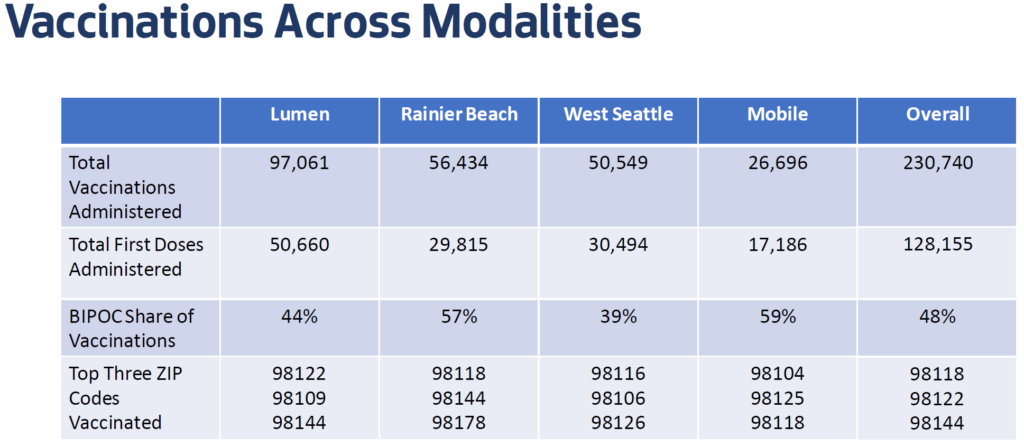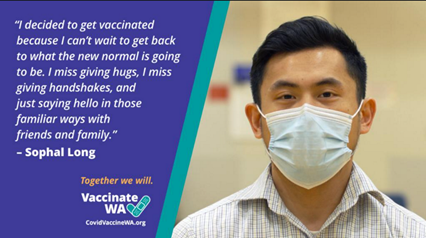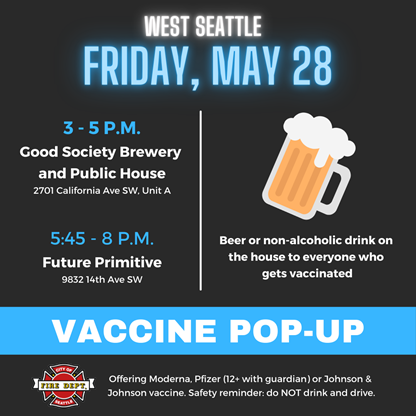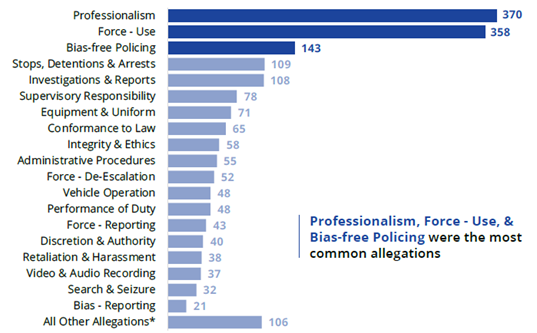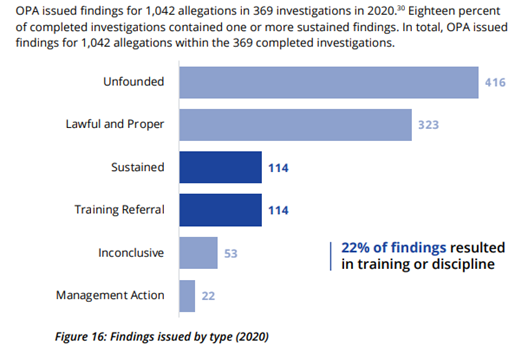Reflections on the 1 Year Commemoration of the Murder of George Floyd by Minneapolis Police Officers; Covid Updates – West Seattle Covid Site Changes, Free Rides to Vaccinations, A Shot & A Beer; Office of Police Accountability 2020 Annual report; Stronger Protections for Small Business and Nonprofit Tenants; Proclamation Celebrating Landmark Civil Rights Legislation; 911 Dispatch Transferred from SPD; King County Eviction Prevention and Rental Assistance Program
Reflections on the 1 Year Commemoration of the Murder of George Floyd by Minneapolis Police Officers
May 25th marked the one year anniversary of the death of George Floyd. I made the following comments at the beginning of the Public Safety and Human Services committee the morning of the 25th:
The Seattle Times ran a column by K. Ward Cummings this week about the risk of the pendulum of support for the Black Lives Matter movement swinging towards the status quo based on the history of that occurring when past generations have called for justice for Black Americans. He wrote: “Like freedom, selfishness is a foundation stone of the American experience. Our history is one long pattern of certain people satisfying their selfish needs at the expense of a selected few — beginning with a dispossession of the Indigenous peoples and then the exploitation of enslaved Africans. The observant learn quickly that racial justice in America arrives and recedes like the sweep of a pendulum: out toward justice for a time and then back again toward selfishness.”
The risk of that is seen in our efforts in Seattle this year too. My SPD budget bill may be one such example. I’m trying to forge a compromise that sticks to our commitment to hold SPD accountable for 2020 excessive overtime spending to police protests. My bill includes a nearly $3 million dollar reduction in SPD spending and it’s opposed by some on the Council because it’s not the full $5.4 million and opposed by others because it’s any cut at all. Despite the fact that SPD will have $13 million in salary savings available in its 2021 budget, and additional funds from a proviso release. To me this is an example of a loss of urgency in City Hall to find ways to reallocate funds from the SPD budget towards other public safety investments and it signals that the pendulum is swinging back to the status quo, away from the unity the Council has had over the last year on our efforts. Another example is the unraveling of the Council’s unified position from the fall on moving SPD’s Parking Enforcement Officers into the new Community Safety and Communications Center in support of the PEO 100 worker, majority BIPOC, workforce vision of community safety and mostly in response to the Durkan administration’s lobbying.
Last summer we asked the court to maintain the consent decree in the face of outsized police response to mostly peaceful protests, and now we are faced with a consent decree that is a barrier to passage of policy regulating the use of weapons like blast balls and tear gas. And a consent decree that is a barrier as well to the Council fulfilling our commitment to reduce SPD’s budget to hold them accountable for unauthorized overtime spending beyond the budget authority granted by the Council and using those funds for other pressing public safety needs.
We were asked last summer for the City to withdraw the City’s lawsuit opposing King County’s new inquest process. We did so and today families still waiting for inquests still don’t have answers.
But we must also recognize our accomplishments.
Here are steps the City Council has taken in the past year:
Policing Alternatives:
- Expanding Health One to create three response teams to allow firefighters & social workers to respond to more 911 calls and lessen police responses. Adding crisis counseling to support our first responders’ mental health. Health 2 came online in April, and Health 3 will launch in August.
- The Council created the Community Safety and Communication Center, where just yesterday we transferred our 911 dispatchers out of SPD. This is a big step forward in recalibrating our dispatch efforts to things that are not sworn officers. The Council is still considering the transfer of PEOs from SPD to the CSCC where we’ve seen over 100 PEOs, many of whom have called in to Council meetings to share their workforce-drive vision for taking on work that’s currently done by sworn officers, but should not be. Responding to non-injury collisions for example.
- Reducing our reliance on incarceration by redirecting $18 million from this year and next in the King County Jail contract to community-based health and housing programs that promote upstream safety and health.
- Investing $4 million to launch the Seattle Community Safety Initiative: three community safety hubs and wraparound services in the Central District, Southeast and West Seattle
- Investing $12 million to build the capacity of community-based organizations working to build safety from the ground up in our neighborhoods, including ending violence and reducing crime
- Moving SPD’s Victim Advocacy Team, for crisis response, to the Human Services Department
- Restoring $1 million to the Office of Civil Rights for grants to organizations pursuing alternatives to or addressing harms caused by the criminal legal system
- Transferring Mental Health Professionals on SPD’s Crisis Response Unit to the Human Services Department, to respond to behavioral health crises
- Investing $1 million to expand neighborhood-based teams of mental health, medical, substance use disorder professionals to respond to individuals experiencing chronic or acute behavioral health issues, particularly people experiencing unsheltered homelessness.
- Funding a restorative justice pilot program in Seattle Public Schools
- Adding a crisis counselor to Seattle Fire Department to increase positive interactions with persons in crisis or suffering with mental illness.
- Allocating $30 million for a Participatory Budget process to increase civic engagement and inform future policy-making, and make investments to address build community safety, based on research and recommendations from the Black Brilliance Project
Policing Accountability
- Passing the Mi’Chance Dunlap-Gittens’ Youth Rights Ordinance (named after a teenager who, in 2017, was shot and killed by plainclothes deputies during a misguided King County Sheriff’s Office’s sting operation that wrongly targeted two teens.) The ordinance requires that if a youth 17 years of younger is read their Miranda rights that they be allow to consult with legal counsel in person, by telephone, or by video conference.
- Passed legislation requiring Seattle police officers to display their badge numbers while wearing mourning bands, following constituent concerns that officer badge numbers were not visible during protest demonstrations.
- Passed legislation to strengthen subpoena power of Office of Police Accountability and Office of Inspector General
- Reaching an agreement, for the first time, for the Community Police Commission to have a formal role in police union contract negotiations
- Removing outdated drug and prostitution loitering laws from the Seattle Municipal Code, as recommended by the Reentry Work Group
- In addition, a number of Councilmembers advocated at the state legislature for changes to state law in pursuit of greater accountability measures
Seattle City Council took these votes to pass these laws and enact this funding, but it was all made possible by the voices and sustained action of thousands of people who made it clear – day after day, in the middle of a pandemic no less – that community safety can not be achieved without a fundamental restructuring of our City’s response to crisis calls, and non-police alternatives to people in crisis.
It is appropriate that, on this day, we hear from our Office of Police Accountability about their work over the past year. Director Myerberg himself has said that OPA isn’t perfect. In fact, he says changes are needed to keep improving accountability systems both locally and statewide. Hearing his report, together with the recommendation of the Office of the Inspector General and the Community Police Commission is part of improving an imperfect system of accountability.
I want to honor the life of George Floyd this morning but also recognize the deaths of Shaun Fuhr, Terry Caver, Derek Hayden, and Gregory Taylor at the hands of Seattle police officers over the last year.
Covid Updates – West Seattle Covid Site Changes, Free Rides to Vaccinations, A Shot & A Beer
June 9th is Final Day for Vaccinations at West Seattle Site: This week, the City announced the West Seattle Community Vaccination Hub at 2801 SW Thistle St. will stop offering vaccinations after Wednesday, June 9th. If you still need your first or second shot, make an appointment online now or call (206) 684-2489.
District 1 residents have been vaccination all-stars! This map from Public Health – Seattle & King County shows that across District 1, nearly 80 percent of residents have started the vaccination process. Nearly 60 percent are fully vaccinated. This trend leads the national average, and West Seattle and South Park have some of the highest vaccination rates in King County. Thank you to everyone who has sought out vaccination so far!
Meanwhile, demand for vaccination has dropped off significantly at the West Seattle site, after a temporary surge when 12-15 year-olds became newly eligible.
“The West Seattle site has been important to the City’s overall strategy for providing testing and vaccine access in the fight against the pandemic; but now, vaccines are more readily available through pharmacies and medical clinics,” said Seattle Fire Department Acting Captain Brian Wallace. “We have already seen a lot of success at reaching people through pop-ups at sporting events and through business partnerships. This shift allows us to invest more in these outreach efforts.”
SFD Mobile Vaccination Teams (MVT) will focus their efforts in West Seattle on in-school clinics and pop-ups, and vaccinating students and families at eight schools in the West Seattle area as part of the in-school vaccination effort.
Free Rides to Vaccination: From now until July 4th, you can get a free ride to and from your vaccine appointment from Uber or Lyft. Just open up your Uber or Lyft app and follow the simple instructions to claim your free ride.
For those who are low-income, a senior, have a disability, or are a veteran, there are several free and low-cost transportation options to vaccine clinics. Just call Hopelink’s Vaccine Helpline at 425-943-6706 (press 5 for language assistance) or visit the Find a Ride website.
A Shot & A Beer: On Friday, May 28, Seattle Fire Department is bringing the Johnson & Johnson, Moderna, and Pfizer vaccines directly to District 1’s Good Society Brewery and Future Primitive Brewing. Along with your vaccination, and Good Society and Future Primitive are offering beer and non-alcoholic drinks on the house to all those vaccinated at the clinic!
Second doses are available with proof of first vaccination, so bring your vaccination card.
Covid Testing Returns to the West Seattle Vaccination Site: Starting immediately, you can get a free Covid test again at the 2801 SW Thistle Covid site. Tests are now administered by UW Medicine, with appointments available immediately. These are self-swab tests where the patient conducts their own test under observation from a health care professional. Results are provided by UW Medicine within 24-48 hours.
Testing is available regardless of citizenship/immigration status. COVID-19 tests are free and insurance is not required. Testing will be available Monday-Saturday from 9am-5:30pm. Two ways to make an appointment:
- Click here, then scroll down and click on the West Seattle link, or
- Call 206-477-3977; in-language services are available over the phone.
Check out KingCounty.gov/Covid/Sites for information about Covid testing, and an updated list of locations offering free Covid tests.
Office of Police Accountability 2020 Annual report
The Office of Police Accountabilty (OPA) has released its 2020 Annual Report. OPA is charged with investigating officer misconduct. The OPA presented the report before the Public Safety and Human Services Committee earlier this week.
At my request OPA Director Myerberg also provided an update about the presence of six police officers in Washington D.C. on January 6:
Myerberg noted the investigation includes in-depth interviews with the involved officers, identification and interview of independent witnesses, collection and review of evidence (e.g., Body Worn Video, In-Car Video, 3rd party video, hotel and meal receipts), and obtaining and reviewing copies of police department reports related to the incident. He noted two supervisors traveled to DC.
In the committee meeting, Myerberg noted the officers involved will be interviewed a second time.
Once the investigation is complete, the investigative file is given to the Director for review and issuance of the case findings. The 180-day deadline for the completion of the investigation is July 5. Myerberg confirmed the investigation is on schedule to meet that deadline.
Below are a few high-level points from the 2020 report.
The report notes a significant number of complaints received between May 29 and June 12 relating to demonstrations. OPA estimates it received at least 19,000 contacts related to protest response during 2020 (13,181 complaints were about a single incident).
OPA opened 773 cases in 2020, classifying 56% of complaints as meriting investigation. Of those, 64% were received from the public. Instead, in past years more than half of investigations were initiated within SPD:
The most common allegations were about professionalism and use of force, with bias-free policing third highest:
Most employees with a complaint had one complaint, though several had more than one:
18% of OPA investigations included one or more sustained finding (some investigations include more than one allegation):
OPA issued sustained findings in 64 cases during 2020, with 114 sustained allegations against 68 employees, with disciplinary action as noted below:
63% of complaints were from the East and West Precincts:
Out of 99 completed investigations arising out of the 2020 protests, OPA has recommended sustaining allegations in 22 of these cases (22%) against a total of 37 SPD employees. Six of the cases involved sustained use-of-force findings; one involved a sustained force reporting violation. Thus far, in 2021, the Chief has overturned 2 of OPA’s findings, notably in the “pink umbrella” case where the OPA sustained finding against the officer for dispersing a crowd and using less lethal force against SPD policy. Between January 1 and March 31, 2021, as a result of OPA’s investigations, the Chief imposed discipline on 34 officers. A law authored and sponsored by former City Councilmember Nick Licata in 2007, in SMC 3.28.812, requires in those instances when the Chief of Police disagrees with the OPA finding: “If the Chief of Police decides not to follow the OPA’s written recommendation on the disposition of an OPA complaint, the Chief shall make a written statement of the material reasons for the decision.”
The OPA also makes policy recommendations for management actions in the annual report, which are linked here.
Stronger Protections for Small Business and Nonprofit Tenants
On Monday, the City Council approved my legislation, cosponsored by Councilmembers Morales and Lewis, that strengthens tenant protections for small businesses and nonprofits impacted by the pandemic. With the current commercial eviction moratorium expected to be lifted June 30, it’s essential that small businesses and nonprofits know about these protections, and come to the table to negotiate plans that will protect Seattle’s beloved small businesses and the essential nonprofits who serve their communities.
The legislation ensures that rent installments paid according to a payment plan negotiated between a tenant and landlord cannot be considered “late,” and used against the tenant to break their lease. This legislation strengthens already-existing protections in Ordinance 126006, which I sponsored and was passed by Council in April 2020 during the early days of the pandemic. Together, small businesses and nonprofits should expect:
- Commercial rent control, by way of a moratorium on all rent increases for small businesses and nonprofits, as long as the civil emergency persists
- Requires lessors to accept late rent paid in installments according to a payment plan during the civil emergency, and for six months following.
- The parameters of an acceptable payment plan are:
- Can’t require the small business or nonprofit to pay more than 1/3 of late rent within any month or period
- All late rent must be repaid within a year of the end of the civil emergency; and
- No late fees, interest or other charges can be added.
- The parameters of an acceptable payment plan are:
Small business and nonprofit tenants interested in receiving assistance to exercise these protections can contact the City’s Office of Economic Development (OED) to learn more, receive technical assistance, and find a lease amendment toolkit. Call OED at (206) 684-8090 from Monday to Friday 9 a.m. to 5 p.m. or email OED at oed@seattle.gov anytime. Translation is available. OED also maintains lists of resources for businesses and nonprofits impacted by the pandemic.
I hope this legislation encourages small businesses, nonprofits, and their landlords to have productive conversations about what it will take to keep the businesses and nonprofits in place, while making their lessors financially whole.
Proclamation Celebrating Landmark Civil Rights Legislation
On Monday, I was honored to present a proclamation, signed by Councilmembers and the Mayor, declaring Tuesday, May 25th to be Education for All Day in Seattle, to Gene Boes, President and CEO of the Northwest Center.
This proclamation acknowledges the 50th anniversary of landmark legislation passed in Washington in 1971: House Bill 90, commonly referred to as the “Education for All Act.” Education for All was the first law in the nation to grant kids with disabilities access to public education, and it directly inspired what became the federal Individuals with Disabilities Education Act (IDEA), which Congress passed four years later.
I want to thank Northwest Center for their work on this proclamation, and their work every day to promote the independence of people with disabilities. In particular, thanks to Mary Sheely, and to NW Center founder Janet Taggert, one of the original authors of Washington’s Education for All law. To learn more about Education For All, check out this video discussion with its authors, reflecting on 50 years of impact.
911 Dispatch Transferred from SPD
During budget deliberation last Fall the Council unanimously passed Ordinance 126233 which established the new Community Safety and Communications Center (CSCC) and included the plan to move both 911 dispatch and Parking Enforcement Officers (PEOs). On Monday the Council passed CB 120065 which transferred 911 dispatch to the CSCC.
Moving these functions to the CSCC was intended to help reframe how the City provides for community safety and respond to the Council’s interest in exploring expanded duties for the PEOs. The Council’s previous budget actions provided that the CSCC would begin performing the 9-1-1 call center functions by June 1. The legislation also intended PEOs to be moved simultaneously. However, during Full Council on Monday we took action which delayed the PEO move to a future date.
911 dispatch has been called the gatekeeper for the whole criminal justice. 911 training within police departments typically emphasizes a police response. In 2015, 83 of the 153 unarmed people who were killed by police nationally came into contact with police because of a 911 call. The actions we took on Monday are part of Seattle’s work to develop a crisis response that doesn’t rely on an armed police response.
Next steps will include training and support of 911 dispatch to identify more calls that would benefit from a non-police response, from Seattle Fire Department’s Health 1 and the new (expanded this year) Health 2 unit, or the Mobile Crisis Team program also funded this year to pilot with a law enforcement referral.
King County Eviction Prevention and Rental Assistance Program
King County has announced $145 million in eviction prevention and rental assistance. Applicants will be able to get back rent and has many as three months of future rent for a total of 12 months of assistance. Landlords must agree not to terminate or refuse to renew tenancy until after December 31, 2021, except for special circumstances such as sale of the property or health and safety issues.
If you are a tenant, please go to this link to apply for these funds. If you’re a landlord who’s previously applied for these funds you can check the status here.
Posted: May 28th, 2021 under Councilmember Herbold, COVID-19, Education, Homelessness, Office of Police Accountability, Police Department, Proclamations, Public Health, Seattle Fire Department
Tags: 911 Dispatch, A Shot & A Beer, Civil Rights Legislation, COVID, Education, Eviction, George Floyd, Health One, IDEA, King County Eviction Prevention, Minneapolis Police Officers, Mobile Vaccination Teams, MVT, Nonprofit Tenants, Office of Police Accountability 2020 Annual report, OPA, PEOs, police, police accountability, Proclamation, Rental Assistance Program, restorative justice, Seattle Community Safety Initiative, SFD, small business, SPD, Vaccinations, West Seattle



